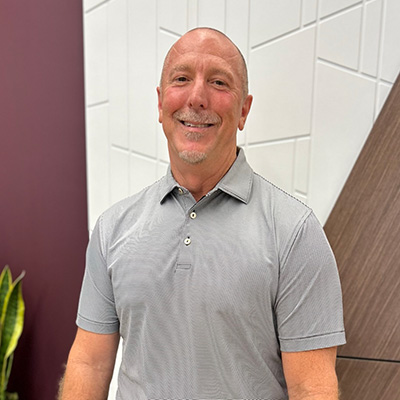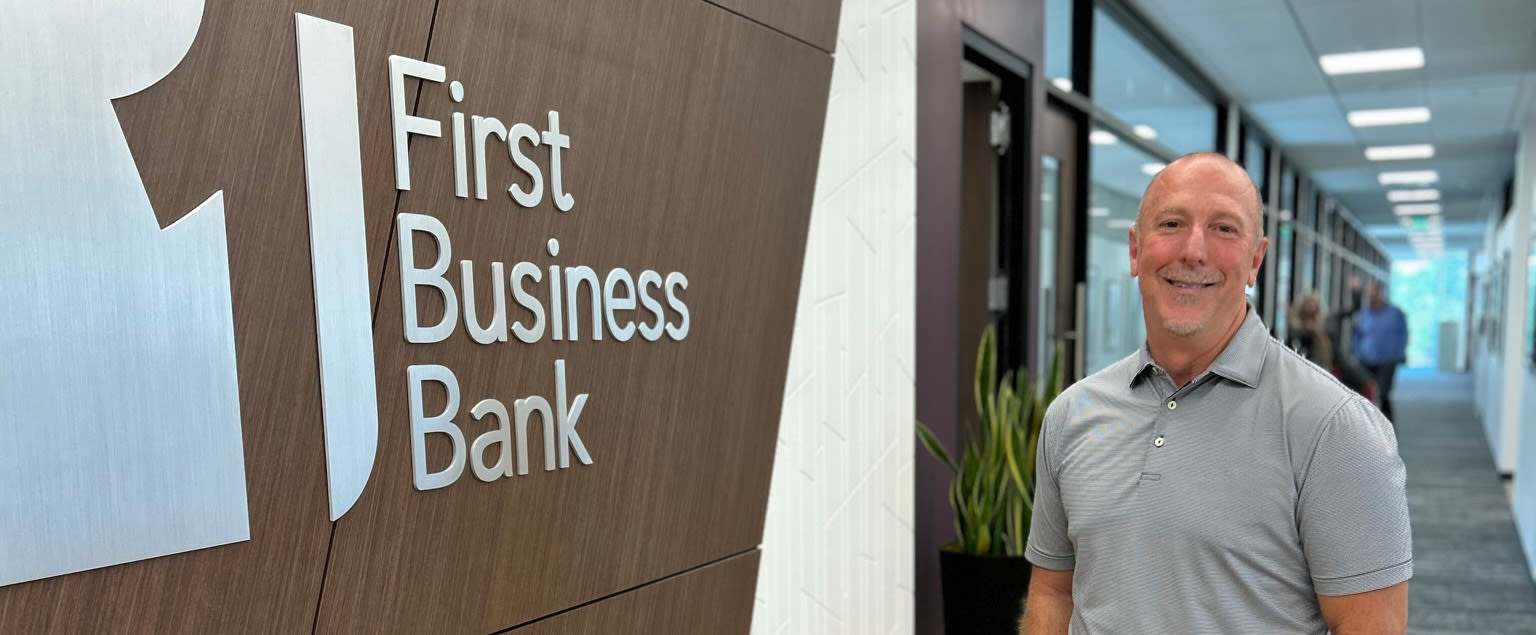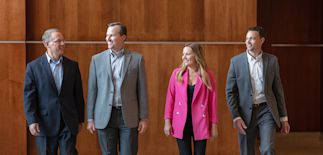 Scott Crist, Vice President II - Treasury Management, joined First Business Bank in 2018 with decades of robust banking experience, a desire to help businesses optimize their cash flow, and a dream to climb one of the tallest mountains in the world.
Scott Crist, Vice President II - Treasury Management, joined First Business Bank in 2018 with decades of robust banking experience, a desire to help businesses optimize their cash flow, and a dream to climb one of the tallest mountains in the world.
At first glance, you might think that, as a high-performing contributor to our Kansas City Metro team, Scott’s demanding role could get in the way of his dream, but not at First Business Bank. With several summits under his belt and coordinated support from his coworkers and his loved ones, Scott began his preparations to climb Denali more than a year before his expedition.
The Allure of Expeditionary Mountaineering
Over a decade ago, Scott first learned about expeditionary mountaineering while watching the Discovery channel.
"It checks all the boxes as far as what I really like and what drives me," he explains. "First, not many people can do it from a physical standpoint, but it’s also mentally and emotionally challenging. Expeditionary mountaineering grinds you into the ground every day — there's no way to tap out and quit," Scott says. “I also enjoy seeing the mountains in a way that not many people have seen them."
Growing up, Scott was always competitive, playing a multitude of team sports, including baseball since he was four years old. He likens expeditionary mountaineering to a team sport, emphasizing the importance of teamwork.
"When you’re on the mountain, you're roped to three or four other people,” he says. “All of a sudden, if you are the weak link, it can literally kill the entire team. You're very dependent on each other's skill sets and being part of the team.”
Scott remembers seeing his first big mountains while on vacation with his family. "My first experiences were mostly in the Rockies,” he says. “As a child, we took a lot of vacations out that way, driving past the mountains because my parents weren't hikers or backpackers.”
While many are content with admiring the mountains from a distance, Scott wanted to experience them up close, so his expeditionary mountaineering journey began at Mt. Rainer in 2010 in Washington State. "It's the jumping/training ground for all mountaineers. If you want to climb mountains around the world, Rainer is great for training."
The Rigorous Preparation for Denali
Scott's journey to Denali was not a spontaneous decision. It required meticulous physical and mental planning, as well as coordination at work. "Physically, it takes at least a year to get ready for Denali," he says.
For his Denali expedition, Scott chose to climb with RMI Expeditions, a guide company with a rich history. "They've been guiding mountaineering expeditions since the 60s, but the family that owns the company has a history that goes back into the 30s and 40s. It’s a tremendous program," he praises.
Because of the inherent risk of climbing one of the tallest mountains in the world, guide companies screen candidates to ensure they are sufficiently experienced. “I could not just show up and climb Denali,” Scott says. “You have to present a resume with sufficient skills and training. You have to interview.”
As the climbers work as a team and their lives depend on each other, the trust between them is paramount. "You meet the other climbers at the baggage claim at the Anchorage airport,” he says. “They know what to expect. You are truly trusting that they know what they're doing."
While Scott always maintains a fitness routine, preparing for Denali required a different approach. "I always stay physically fit, usually alternating between Crossfit and running each day of the week. Even with that training, that was not remotely where I needed to be for this mountain," he says.
As the climb approached, Scott intensified his regimen. "With 75 pounds of sand in a backpack, I went nonstop up and down stairs for a solid hour over lunch. At the end of the day, I'd do two more hours. It involved a lot of squats and cardio to build my endurance levels.”
Unwavering Support from First Business Bank
Scott's journey to Denali, which was predicted to last about one month, was not just a personal endeavor. It involved the unwavering support of leadership and his coworkers at First Business Bank.
Scott approached senior leaders at First Business Bank about his plans to climb Denali a year and a half before the scheduled climb, knowing he’d need buy-in to reserve his expedition date.
"When those expedition dates drop, you have to grab them," Scott explains. “So I went to Human Resources, which treated the expedition like a sabbatical. My team, especially Chuck Peterson, was really supportive and instrumental in preparing for a smooth transition during my absence. I worked with our IT department so when clients called my phone, it would also ring at three or four other phones.”
However, an unexpected tragedy happened two weeks before Scott’s planned departure — Chuck suddenly passed away. "All this planning no longer was relevant," he recalls. “But First Business Bank was incredible. Jim Hartlieb, President of First Business Bank, called and said, ‘You are going to do this. Let Chuck’s unexpected death teach us all a lesson that tomorrow is not guaranteed. We will figure it out.’”
Then, a week before his trip, Scott got a call from Corey Chambas, CEO of First Business Financial Services, Inc., parent company of First Business Bank. “Corey, I believe, heard about my climb from Jim Hartlieb, and reached out to wish me well. I think that also speaks to our culture at First Business Bank that the CEO of the company would take time out of their day to pick up the phone and call before my trip.”
The Ascent: Challenges on Denali
On the day the expedition started, he met the others at the airport. "The packs are so heavy at the beginning that you can't put it on yourself. They are 90 pounds and you’re also pulling a sled that has another 60 to 70 pounds in it," describes Scott.
The mountain has seven specific camps, and climbers aim to reach each one progressively. However, Scott's journey took a turn at the 14,500 ft camp. They needed to climb up to bring half of their supplies, climb back down, and bring the rest of the supplies up the next day.
"We made it up, but the weather was horrible; a blizzard turned into a 14-hour day,” Scott said. “I made it up fine, but coming down, I started sliding." This resulted in a severe knee sprain, which became a significant setback.
Despite the injury, Scott had to decide whether to continue or turn back. "One of the other RMI teams had caught up to us, one of the persons on that team happened to be an orthopedic surgeon who specialized in knees,” he said. “She examined it and said, “This is not good. You may be able to make it to the summit, but you still have to get all the way back down.”
After a conversation with her and some self-reflection, Scott decided to stay back. "We initially had seven climbers and four made the summit,” he says. “Three of us did not make it for various reasons." The journey back was excruciating. "When our climbers started back down, it was the most painful grueling 16 hours of my entire life. There was not one step that did not hurt," he recalls.
Overcoming Doubts On Denali
Every mountaineer faces moments of doubt, and Scott was no exception. When asked if he ever second-guessed his decision, he says, "Having done three of these before, I knew how tough it would be and how to prepare for it. My age worried me a little, and the last mountain I climbed was in 2015. Several years had gone by, but I felt I was in good shape. However, on day one of the expedition, we all were second-guessing. Day one is horrible,” he explains. “You have all your gear, and you haven't started eating any of your food. Day one makes you second guess everything." However, with determination and grit, Scott pushed through, proving that some challenges are just stepping stones to success.
Climbing Denali presents its own set of challenges, and one of the most harrowing moments was during their move from Camp 2 to Camp 3. "Everybody knows how dangerous it is," Scott begins. "Two-thirds of the way into the day, we ran into an all-out blizzard. You couldn't see the climber in front of you," he recalls. Their GPS pin from the previous day was their only guide back. During this blizzard, they received an SOS signal from a solo climber. "His tent got away from him. We found him three days later; his hands and feet were frozen solid, and his heart rate was 12. We're pretty sure he didn't make it," Scott says, somberly. It was a stark reminder of the mountain's dangers.
Surviving Extreme Conditions Of Denali
The actual expedition was scheduled for 21 days, but due to various challenges, it lasted almost 30 days. Living in such extreme conditions took a toll on Scott's body. "I arrived back home in Kansas City 18 pounds lighter — the clothes I wore up there did not fit," he shares. He also speaks of the physical aftermath of the climb, from nerve damage to frostbite and the challenges of readjusting his diet. "Getting my eating squared away was one of the hardest things," he admits.
Climbing Denali was not just a physical challenge for Scott; it was a transformative experience that offered profound insights into life and self-awareness.
"All the mountains have an impact on you," Scott begins. "For all my life, people have talked about being in the moment. I now fully understand what that means." He describes the grueling routine of carb-loading, managing energy, and the sheer determination it takes to keep moving forward. "You put your head down, stare at the rope right in front of you, and tell yourself — all I have to do is take one more step," he says. This intense focus on the present moment, he believes, translates well to life. "Sometimes the big picture is so overwhelming. There's a bunch of life lessons in it."
When asked about what surprised him the most, Scott speaks of the awe-inspiring beauty of Denali. "It's big; it's almost overwhelming," he describes. The mountain's vastness, its remoteness, and the sheer desolation of its landscape left a lasting impression on him. "Just snow and ice as far as you can see," he recalls.
Steadfast Support For Big Challenges
Throughout his challenging journey, Scott had a strong support system. "There were so many people supporting me — it was really a team effort," he says. His significant other, Cynthia, was a pillar of support, understanding the long hours of training and the financial implications of the trip. "It's a very expensive sport. This trip, all in, was a $25K trip," he says.
The support from First Business Bank, his teammates, and his Rotary club was invaluable. "They were unbelievably supportive," he says, grateful for the community that rallied behind him during this monumental challenge.
Climbing Denali has undoubtedly influenced Scott's work ethic. "You've got to be driven to think about doing it. I set goals and work hard to achieve them," he says. He believes his accomplishment reflects positively on First Business Bank and its support for employees' personal goals.
Although Denali was a monumental achievement, Scott has no plans for similar expeditionary climbs in the future. "Years worth of training, months of recovery. I've accomplished what I wanted to do," he says. However, he looks forward to smaller mountains and backpacking trips, with dreams of tackling big trails like the Appalachian Trail and El Camino in Spain.
Advice For Aspiring Climbers
For those contemplating a similar climb, Scott's advice is clear: "First and foremost, don't go alone." He emphasizes the importance of training and being in top physical shape. "However good of shape you are at sea level, overtrain," he advises.
Scott says others can accomplish their big dreams with passion and adaptability. "First and foremost, you have to be passionate,” he says. “If you're not passionate, it's really hard to invest yourself in it enough to be successful.” He advises breaking down big goals into smaller, achievable components and being open-minded to adapt when challenges arise. "So many people get derailed from their goal at the first speed bump,” he says. “You have to rethink it — consider taking slightly different path to accomplish the bigger goal.”





